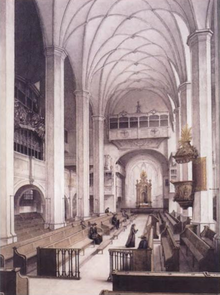BWV 36
|
Schwingt freudig euch empor BWV 36 |
|
|---|---|
| Church cantata by J. S. Bach | |

Thomaskirche, Leipzig
|
|
| Related | based on 36c |
| Occasion | First Sunday in Advent |
| Performed | 2 December 1731: Leipzig |
| Movements | 8 |
| Cantata text | Picander? |
| Chorale | |
| Vocal | SATB choir and solo |
| Instrumental |
|
Schwingt freudig euch empor (Soar joyfully upwards),BWV 36, is a church cantata by Johann Sebastian Bach. He composed it in Leipzig in 1731 for the first Sunday in Advent, drawing on material from previous congratulatory cantatas, beginning with Schwingt freudig euch empor, BWV 36c (1725). The Gospel for the Sunday was the Entry into Jerusalem, thus the mood of the secular work matched "the people's jubilant shouts of Hosanna". In a unique structure in Bach's cantatas, he interpolated four movements derived from the former works with four stanzas from two important hymns for Advent, to add liturgical focus, three from Luther's "Nun komm, der Heiden Heiland" and one from Nicolai's "Wie schön leuchtet der Morgenstern". He first performed the cantata in its final form of two parts, eight movements, on 2 December 1731.
Bach composed the cantata in 1731 in Leipzig, for the first Sunday of Advent, the beginning of the Lutheran church year. In Leipzig this was the only Sunday in Advent when a cantata was performed, whereas tempus clausum (quiet time) was observed on the other three Sundays. The prescribed readings for the Sunday were from the Epistle to the Romans, "night is advanced, day will come" (), and from the Gospel of Matthew, the Entry into Jerusalem ().
Bach based parts of the music on a homage cantata of the same name, Schwingt freudig euch empor, BWV 36c, which he had composed for the birthday of a Leipzig University teacher and first performed in spring 1725. The text was probably written by Picander, who modified it to a congratulatory cantata for Countess Charlotte Friederike Wilhelmine of Anhalt-Köthen, Steigt freudig in die Luft, BWV 36a, first performed on 30 November 1726. Another version was a congratulatory cantata for a member of the Rivinius family from Leipzig, Die Freude reget sich, BWV 36b, probably in 1735.
...
Wikipedia
